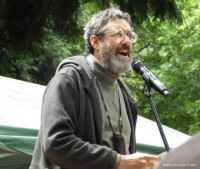
Editor’s Introduction: June 2013
by: Read The Dirt Posted on: June 08, 2013
Welcome to our June 2013 Editor’s Introduction-published on the 8th of every month. Here you will find summaries of eight new Read the Dirt originals and links to this month’s reprints.
We hope you enjoy, among other things, our observance of an emergent rights-based narrative creeping into the American conscience.
This edition includes:
- our first experiments in audio production
- a rights-based articulation from the housing justice movement in Portland, Oregon
- a piece by a Read the Dirt staff writer on the recent historic actions taken by one New Mexican county
- a contemplation about a Community Rights Ordinance for the South Puget Sound region
- a conversation between a nine-year-old fed up with the quality of her school lunches and the 2012 Washington Tilth Farmer of the Year
- a speech connecting the Community Rights Movement to the rising frustration about genetically modified organisms
- the application of a timeless Read the Dirt article to a recent development (the discovery of illegal genetically modified wheat in Oregon)
- and more
If you are looking for part-time copy-editing work or writing assignments, or have a passion for collecting stories, like science writing, could see yourself writing curriculum, or take jaw dropping photos, let us know.
See our Submission Guidelines if you’re interested in submitting.
The Articles:
 Housing Justice: Fighting for Rights: As banks continue to foreclose our homes a new narrative about housing—one focused on rights—begins to emerge. Kari of We Are Oregon, a community and labor organization in Portland, Oregon, lays the framework from which this narrative is sprouting. Kari exposes how the state protects legally enforceable corporate rights, but only ‘honors’ human rights through unenforceable resolutions. Removing corporations’ rights and enforcing human rights, Kari says, “requires removing the state as the protector of corporate interests.”
Housing Justice: Fighting for Rights: As banks continue to foreclose our homes a new narrative about housing—one focused on rights—begins to emerge. Kari of We Are Oregon, a community and labor organization in Portland, Oregon, lays the framework from which this narrative is sprouting. Kari exposes how the state protects legally enforceable corporate rights, but only ‘honors’ human rights through unenforceable resolutions. Removing corporations’ rights and enforcing human rights, Kari says, “requires removing the state as the protector of corporate interests.”
 GM Wheat Discovered in Oregon, Benton County Continues Work on Food Bill of Rights: Benton County, Oregon grows seed (including wheat) for national and international markets. That seed is being threatened by genetically modified organism (GMO) agriculture. Below we hear from a Benton County farmer about the ramifications of GMO agriculture and what the Benton County Community Rights Coalition is doing to elevate the community’s right to a sustainable food system, seed heritage, and the inalienable rights of nature over corporate “rights” and state preemption in their county. This is an adaptation of Clint Lindsey‘s previous article, which appeared before the discovery of GMO wheat. This version also includes an update on the status of the Benton County Food Bill of Rights ordinance. Our previous article “Fighting for the Right to a Sustainable Food System: Benton County, Oregon” complements this piece.
GM Wheat Discovered in Oregon, Benton County Continues Work on Food Bill of Rights: Benton County, Oregon grows seed (including wheat) for national and international markets. That seed is being threatened by genetically modified organism (GMO) agriculture. Below we hear from a Benton County farmer about the ramifications of GMO agriculture and what the Benton County Community Rights Coalition is doing to elevate the community’s right to a sustainable food system, seed heritage, and the inalienable rights of nature over corporate “rights” and state preemption in their county. This is an adaptation of Clint Lindsey‘s previous article, which appeared before the discovery of GMO wheat. This version also includes an update on the status of the Benton County Food Bill of Rights ordinance. Our previous article “Fighting for the Right to a Sustainable Food System: Benton County, Oregon” complements this piece.
 (Audio): Read the Dirt’s Coverage of the Public Interest Environmental Law Conference: Read the Dirt was in attendance at this spring’s Public Interest Environmental Law Conference in Eugene, Oregon. We recorded three speeches, and spoke with select presenters.
(Audio): Read the Dirt’s Coverage of the Public Interest Environmental Law Conference: Read the Dirt was in attendance at this spring’s Public Interest Environmental Law Conference in Eugene, Oregon. We recorded three speeches, and spoke with select presenters.
 A Conversation about School Lunches, a Student and a Farmer: In a letter Anabel Magee, 9, expresses her frustration about the state of her school lunches. Clayton Burrows of Growing Washington, the 2012 Washington Tilth Farm of the Year and Washington Farm to School participant, responds. Clayton is a Read the Dirt co-founder.
A Conversation about School Lunches, a Student and a Farmer: In a letter Anabel Magee, 9, expresses her frustration about the state of her school lunches. Clayton Burrows of Growing Washington, the 2012 Washington Tilth Farm of the Year and Washington Farm to School participant, responds. Clayton is a Read the Dirt co-founder.
 County Government Writes History, Hydrocarbon Ban is First of its Kind: Read the Dirt staff writer Alex Valentine reports on Mora County, New Mexico—the first county in the nation to ban oil and gas extraction by introducing new legal rights and elevating those rights above preemption from other levels of government and the “legal privileges and powers” of corporations. The new rights include: right to self-government, right to water, rights of natural communities, right to a sustainable energy future, and the rights of Querencia de la Tierra, local indigenous people’s conception of their homeland—Love of the Land.
County Government Writes History, Hydrocarbon Ban is First of its Kind: Read the Dirt staff writer Alex Valentine reports on Mora County, New Mexico—the first county in the nation to ban oil and gas extraction by introducing new legal rights and elevating those rights above preemption from other levels of government and the “legal privileges and powers” of corporations. The new rights include: right to self-government, right to water, rights of natural communities, right to a sustainable energy future, and the rights of Querencia de la Tierra, local indigenous people’s conception of their homeland—Love of the Land.
 A Community Rights Ordinance For South Puget Sound: A resident of Thurston County, Washington gives her perspective on the logic of Community Rights Ordinances, the Washington State Community Rights Network, the national Community Rights Movement, and the deficiencies of existing legal structures. She speaks to her neighbors in the South Puget Sound region, however the questions she raises are not geographically limited.
A Community Rights Ordinance For South Puget Sound: A resident of Thurston County, Washington gives her perspective on the logic of Community Rights Ordinances, the Washington State Community Rights Network, the national Community Rights Movement, and the deficiencies of existing legal structures. She speaks to her neighbors in the South Puget Sound region, however the questions she raises are not geographically limited.
 Food Bills of Rights and Monsanto-Speech: Paul Cienfuegos articulates the connection between the Community Rights Movement and the growing resistance to genetically modified foods. Cienfuegos gave this speech at the March Against Monsanto rally on Saturday, May 25th in Portland, Oregon, to a crowd of about 6000 people (police estimate). This is the text of the speech. To watch the speech, go to http://www.ustream.tv/recorded/33313097, and start at 25:30 on the video.
Food Bills of Rights and Monsanto-Speech: Paul Cienfuegos articulates the connection between the Community Rights Movement and the growing resistance to genetically modified foods. Cienfuegos gave this speech at the March Against Monsanto rally on Saturday, May 25th in Portland, Oregon, to a crowd of about 6000 people (police estimate). This is the text of the speech. To watch the speech, go to http://www.ustream.tv/recorded/33313097, and start at 25:30 on the video.
 Living Democracy as Spiritual Practice (Or Vice Versa): In Phil Damon’s second Sacred Democracy column for Read the Dirt he begs questions about the connections between spirituality and the practice of what he calls ‘living democracy.’ This article is co-published with Living Democracy.
Living Democracy as Spiritual Practice (Or Vice Versa): In Phil Damon’s second Sacred Democracy column for Read the Dirt he begs questions about the connections between spirituality and the practice of what he calls ‘living democracy.’ This article is co-published with Living Democracy.
Reprints: (We were given explicit permission to reprint the below articles.)
Caring for Home through Nature’s Rights: By Linda Sheehan, via Earth Law Center
From Field to Table: Rights for Workers in the Food Supply Chain: By Tory Field and Beverly Bell, via Other Worlds
Will Ohio Be Fracking’s Radioactive Dumping Ground?: By Mike Ludwig, via Truthout
Photo: Simon Davis-Cohen
Articles On Featured Originals
Featured Originals:
- Sep 26 Education Sneak Peek
- Jul 21 Check It Out!
- Jun 5 US Climate Movement: Funnel Money Downward if You Want to Survive
- May 19 Part 2: Jordan Cove LNG Backers Spend Huge Money to Sway Tiny Oregon County Election
- May 2 Part 1: Oregon County Faces Gas Industry Funding, Lobbyists in Battle to Halt Jordan Cove LNG Project
- Mar 10 Get To Know The BATS: Teachers Fighting Privatization
- Mar 6 Re-Imagining Local Public Space, From Parks to Post Offices
- Jan 12 For Teachers and Citizens: How to Respond to Federal Immigration Raids
- Jan 5 How To Respond When Your (Local) Government Gets Sued By A Corporation
- May 25 Interview: The Working Class Movement Fighting for Local Authority
- Apr 29 Interview: Challenging Corporations’ ‘Right’ To Grow GMOs in Rural Oregon
- Dec 8 Editor’s Introduction: December 2013
- Nov 8 Editor’s Introduction: November 2013
- Oct 8 Editor’s Introduction: October 2013
- Sep 8 Editor’s Introduction: September 2013
- Aug 8 Editor’s Introduction: August 2013
- Jul 8 Editor’s Introduction: July 2013
- Jun 8 Editor’s Introduction: June 2013
- Jun 8 Housing Justice: Fighting for Rights
- Jun 6 GM Wheat Discovered in Oregon, Benton County Continues Work on Food Bill of Rights
- May 8 Editor’s Introduction: May 2013
- May 8 Does Food Sovereignty Exist in the United States? Food and the Community Rights Movement
- May 8 Washington Community Action Network Talks Rights
- Apr 8 Editor’s Introduction: April 2013

